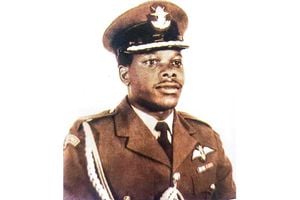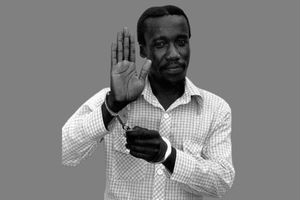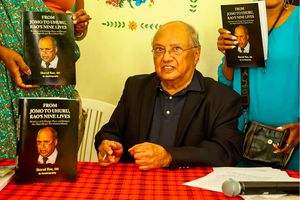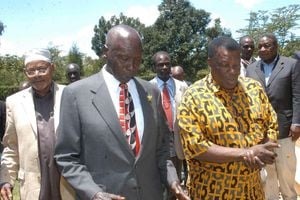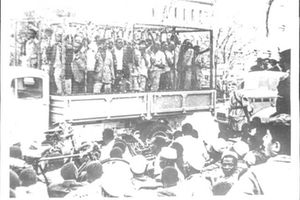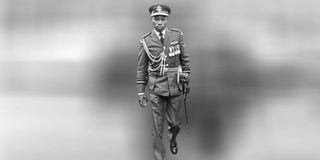
Former Kenya Air Force commander Major General Peter Kariuki.
In 1983, Major General Peter Kariuki, the then Kenya Air Force commander was court-martialled and stripped of his military honours following the 1982 attempted coup.
Former Kenya Air Force Commander Peter Kariuki is a battle-hardened soldier. But the toughest battle he’s been leading in the past 42 years, hasn’t been from the cockpit of a jet fighter, but in the corridors of justice.
In 1982, Maj-Gen Kariuki was the KAF boss when junior servicemen attempted a coup on President Daniel arap Moi’s government.
When order was restored by loyal soldiers, the KAF commander was court-martialed and jailed for four years. He was also stripped of his military rank and honours.
But in 2006, the High Court cleared him of any wrongdoing in the coup attempt. In 2014, the Court of Appeal ordered the reinstatement of his rank, benefits, honours and decorations.
Despite winning the case and obtaining a court order 10 years ago, the government is yet to comply with the decision. Besides the honours, Kariuki is yet to get even a shilling of the Sh71 million the court directed as compensation for violating his constitutional rights.
“Mr Kariuki was stripped of his rank by a court martial in 1983 and has spent more than three decades trying to get it back. The conviction was a travesty of justice as found by the court. Major-General Kariuki is not asking for much – he wants to be given his medals and retired honourably as is the military tradition.
"The Court of Appeal was clear and directed that all the honours should be restored after quashing the court martial. He should be given back his uniforms, shoes and medals. Then get him on the ceremonial vehicle and pull him out of Moi Air Base,” his lawyer, Paul Muite, told The Weekly Review.
“To allow a former KAF commander to live in poverty… without pension is embarrassing to say the least. Why condemn a person who gave so much to the country? He had big dreams when he joined the air force as a teen. He was the first Kenyan pilot to qualify as a multi-engine flight instructor and to fly an aircraft from Canada to the KAF base in Eastleigh. But all that was taken away through a bogus court-martial,” he added.
While quashing the conviction in March 2014, a bench of three judges of the Court of Appeal awarded him Sh15 million as damages for violation of his constitutional rights.
Justices Patrick Kiage, Kathurima M’Inoti and Jamila Mohammed agreed with him that he was subjected to glaring violations and awarded him another Sh22.9 million for his salary and allowances, plus the cost of the cases.
“Those violations cannot be appropriately remedied by an award of damages alone. A conviction founded on such palpable and glaring violation of the right to a fair trial ought not to be allowed to stand,” the judges stated.
Restore honour and decoration
In a sworn statement filed in court, seeking another order to compel the military bosses to comply with the directive, Mr Kariuki said, “That all that the 4th and 5th respondents (CDF and Air Force Commander respectively) are required to do is to organise the necessary parade in accordance with their military practice or norm and restore my rank, honour and decoration as ordered by the court.”
At the time of the mutiny, Mr Kariuki said he was at his farm in Timau, a few Kilometers from Nanyuki. But as soon as the mutiny by soldiers had been quelled, he was arrested and confined for some time at Kamiti Maximum Security Prison.
He was later transferred to Naivasha Maximum Security Prison and held in solitary confinement for 147 days.
And on January 10, 1983, Mr Kariuki appeared before a court martial and was charged with the offences of failing to prevent a mutiny and failing to suppress a mutiny, contrary to Section 26(a) of the Armed Forces Act (repealed).
The court martial was presided by Major-General Lenges, with F. E. Aragon, then a Senior Resident magistrate, as the Judge Advocate. He was convicted about 8 days later and sentenced to four years’ imprisonment for the two offences.
The sentences to run concurrently. In addition, he was dismissed from the Kenya Armed Forces and stripped of his rank, benefits, medals and decorations.
Mr Kariuki served the full sentence after the Commissioner of Prisons declared that he would not be considered for any remission.
Years later, he filed a petition before the High Court for violation of his constitutional rights and freedoms, regarding his arrest and trial before the court martial.
Justice Daniel Musinga (then High Court judge) agreed with him and ordered that he be paid Sh7 million for violation of his rights. The judge, however, failed to order the restoration of his honours, forcing him to file an appeal.
At the appellate court, the three judges said in the judgment that the court martial they came across was a “body epitomising caprice and hell bent on making very arbitrary decisions”, which it could not justify.
First, his application to summon General Jackson Mulinge, the then-Chief of General Staff, as a defence witness was rejected.
The former Air Force Commander denied claims that he failed to suppress the mutiny since he said upon learning of the alleged plan, he passed the information two weeks before, to General Mulinge on July 14, 1982.
Military Intelligence
General Mulinge then decided that the information be passed on to the Military Intelligence as well as the Special Branch for full investigations under his own co-ordination. He considered the General to be a very crucial witness to his defence.
The appellate court said the refusal to summon General Mulinge, as demanded by the former Air Force Commander and the general conduct of the judge advocate, was to compromise his right to fair trial.
A judge advocate is a judicial officer who advises a court martial on points of law and sums up the case.
The record shows that the judge advocate interjected 59 times when the nine prosecution witnesses testified, and 176 times during the evidence of Mr Kariuki’s six witnesses.
According to the court, a majority of those interjections had nothing to do with advising on legal or procedural points.
“The concern is that the record shows that for the greater part of the proceedings, the judge advocate literally took over from the prosecuting counsel, subjecting witnesses to near hostile cross examination,” the judges noted.
The judges said a conviction arrived at on the back of “egregious violations of the magnitude and scale” they found in the appeal was not only a danger to Mr Kariuki, but also the society.
“We have found that the violations of the appellant’s constitutional rights went far beyond his right to liberty and fundamentally implicated his right to a fair trial,” said the judges.
***
Peter Kariuki was enlisted in the Air Force soon after independence and was commissioned as an officer in September, 1965.
He rose through the ranks and by May 14, 1981, he was a Major-General when he was appointed the Commander of the Kenya Air Force by President Daniel arap Moi.
In the early morning of Sunday, August 1, 1982, KAF’s non-commissioned officers mutinied and launched a bid to overthrow the government.
A group of servicemen led by Private Hezekiah Ochuka and Senior Sergeant Pancras Oteyo Ochuka attempted to overthrow the government of President Moi.
The coup plotters had formed a group known as the “People’s Redemption Council”.
He told the court and the court martial that at the time of the mutiny, he was at his farm in Timau, a few kilometers from Nanyuki.
After taking over the Air Force Headquarters at Eastleigh and the air bases at Embakasi and Nanyuki, they seized the international airport, the post office and the national broadcaster, then called the Voice of Kenya.
The coup plotters managed to broadcast to the country and the world that they had taken over power in Kenya. They directed the Kenya Police to assume the status of ‘civilians’ and stay at home.
However, six hours of the mutiny, the tide had turned against the mutineers, as they were swiftly routed out by loyal soldiers from the other services of the Kenya Armed Forces.
Mass looting
In the end, an official tally put the number of those dead at 159 dead.
Besides, there was mass looting and rape in Nairobi. After the mutiny by his soldiers had been quelled, Maj-Gen Kariuki was arrested and confined for some time at Kamiti Maximum Security Prison.
He was subsequently transferred to Naivasha Maximum Security Prison where he was held in solitary confinement for 147 days.
Hundreds of soldiers were arrested and subjected to cruelty including being stripped naked in public and being forced to ‘march’ on their knees across concrete floors while being whipped.
Some were detained for months in waterlogged chambers and denied foods among other harsh conditions.
The soldiers who filed constitutional petitions narrated how they were brutally beaten and at times until they lost consciousness, being held in the dark water-logged cells under extremely inhuman conditions, without food and water, no toilet facilities and even being forced to sleep on water-logged cells and being ordered to remain standing for long hours. Many were forced to plead guilty to the charges while being shifted from one prison.
Those who were released afterward were dismissed from the defence forces without their benefits. Securing a job became more difficult for those who were accused of being behind the failed coup.
Ochuka and Okumu were hanged at Kamiti Prison in July 1987, for treason.

